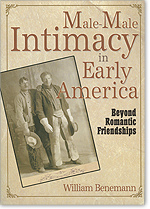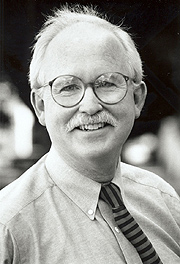Berkeleyan
When bachelorhood was taxed
Boalt librarian turned freelance historian had to read between the lines when researching gay relations in early America
![]()
| 19 July 2006
For more than a decade, Boalt Hall librarian William Benemann has been trolling the attics of history for insights into topics that pique his interest, be they the early years of the law school, Gold Rush-era San Francisco, or the history of gays and lesbians at Berkeley. Recently, he set out to tackle his most challenging and elusive subject yet: the intimate lives of men in colonial America and the early years of the Republic.
 |
The result of his research is Male-Male Intimacy in Early America: Beyond Romantic Friendships, a new book from Harrington Park Press, a gay/lesbian imprint of Haworth Press. In it, Benemann explores the intimate lives of men at sea, men at arms, and men on the frontier; of Native American "two spirits" and African American slaves; and of sexual outlaws in Annapolis, Philadelphia, and Boston. Detailed and wide-ranging, the book limns such topics as the explicitly homosexual subcultures of late-18th- and early-19th-century London, Paris, and Berlin - points of origin for many immigrants to American shores - and homosexual characters invented by Herman Melville, Harriet Beecher Stowe, Tobias Smollett, and other authors popular in early America.
The head of technical services and archivist at the law library, Benemann notes that most works on gay history focus on the post-World War II era, though "the timeline is being moved back a little toward the 19th century." He became interested in blazing a trail even further back in time after researching the life of explorer Meriwether Lewis (1774-1809), who he became convinced was homosexual. To better understand Lewis, he decided to read "every book ever written about what it was like to be a gay man in Meriwether Lewis' time" - only to discover a virtually uncharted historical territory.
The 'imperative of silence'
In his introduction to Male-Male Intimacy, Benemann notes that gay/lesbian historical research is complicated by an "imperative of silence" that is "woven into Western society's attitude toward homosexuality." How many men in colonial America would have been inclined to discuss homoerotic feelings or activities, even in a private journal, given the social and legal consequences? So strong were the pressures to enter into a conventional heterosexual marriage that bachelorhood was punishable by weekly fines in Connecticut and punitive taxes in Maryland, while sodomy was a capital offense everywhere in early America.
 Who needs tenure? Boalt Hall librarian William Benemann researches history with the freedom only a non-academic enjoys. (Steven Underhill photo) |
The resulting secrecy surrounding same-sex relationships makes research strategies in gay history problematic, as the New York Public Library notes in a guide to its gay- and lesbian-studies collections. Scholars, it says, often resort to "intuiting meanings not overtly expressed in historical records or employing materials (such as court or police reports) to identify behavior not discussed in more conventional sources."
Benemann employs both these research strategies in Male-Male Intimacy in Early America - which Associate Professor of English Christopher Nealon, director of the campus's LGBT studies minor, calls "an invaluable contribution to the history of sexuality." Benemann began by reading general histories of early America, noting phrases like "they were intimate companions," "he never married," or "he left the town suddenly without any explanation, and historians are puzzled.."
Supported by a grant from the Librarians Association of the University of California, he then visited archives and historical societies throughout the U.S. to pore over personal letters and journals, newspapers, biographies, and novels for suggestive evidence, between the lines, of the love that dared not speak its name. At the National Library of Medicine and the UC San Francisco Medical Archives, he studied dozens of 18th-century medical treatises describing venereal diseases contracted through homosexual activity; at the U.S. Military Academy at West Point, N.Y., he found military records suggesting that "don't ask, don't tell" has deep historical roots.
'A whole new career'
Benemann credits his training in archival research methods, his knowledge of gay culture, and access to one of the world's great library collections for "opening up a whole new career for me." In the early 1990s, while working at the Bancroft Library, he compiled and edited a collection of Gold Rush-era manuscripts, later published as A Year of Mud and Gold: San Francisco in Letters and Diaries, 1849-1850 (University of Nebraska Press, 1999). The book appeared the same year he turned 50; its positive reviews, he says, "really made me feel I could do this, even though I didn't have a professorial appointment and wasn't on a tenure track in the history department."
If his lack of academic bona fides leads Benemann to "overcompensate," as he puts it, with a vast bibliography of sources, it also leaves him free to research "anything I want to, in a way that someone worried about his career in the history department might not be able to," he says. "If I'm interested in studying lesbians in Victorian America, I don't have to study Victorian labor disputes instead, thinking I'm more likely to get a job that way."
Already he's indulging his freedom with a new research project - this time hunting for evidence of gay life in America in the 1830s and '40s. "Every book written is a piece of a mosaic," he says, "and as the mosaic starts getting assembled, we have a better picture of who we are and where we come from."
William Benemann will read from Male-Male Intimacy in Early America at 7 p.m., Tuesday, July 25, at the Harvey Milk branch of the San Francisco Public Library, 3555 16th St.

